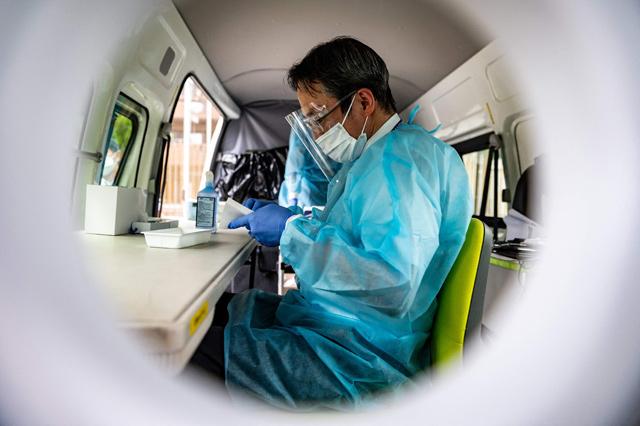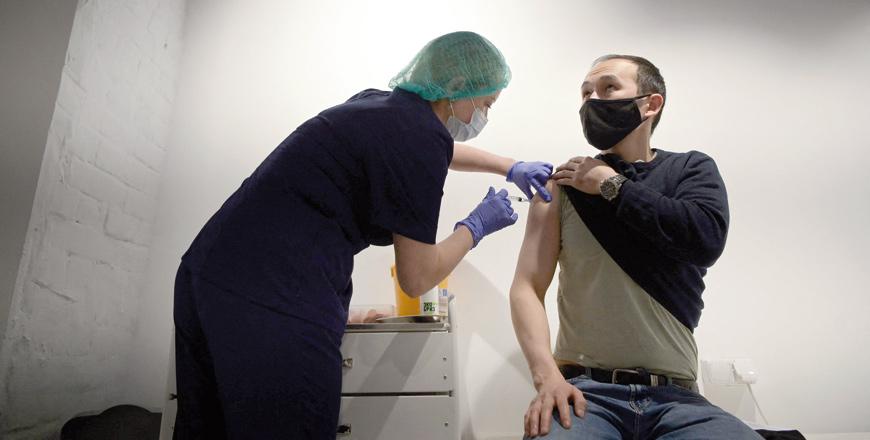You are here
Concern over sporting events as Russia battles Delta variant
By AFP - Jun 29,2021 - Last updated at Jun 29,2021

A medical worker handles a sample during a practice run of antigen testing for the COVID-19 coronavirus at a park near Kabukicho in Tokyo's Shinjuku district on Monday (AFP photo)
MOSCOW — Russia's Saint Petersburg posted record COVID-19 deaths Monday as it prepares to host a Euro 2020 quarter-final despite the worrying spread of the Delta variant, which is fuelling infection surges around the world and causing a headache for major sporting events.
While wealthy countries have started bringing down infections through rapid vaccination drives, outbreaks are still raging from Bangladesh and Indonesia to South America, fuelled in large part by the highly infectious Delta variant, which was first detected in India.
The strain is now in 85 countries and is the most contagious of any COVID-19 variant so far identified, according to the World Health Organisation.
Faced with this surge in a pandemic that has already killed more than 3.9 million people worldwide, officials are racing to vaccinate their populations.
The US Pacific territory of Guam has gone one step further and will offer visitors a COVID-19 vaccination with their tropical holiday, in a bid to restart its struggling tourism industry.
Olympic worries
In Moscow, the epicentre of Russia's outbreak, businesses have been ordered to send home some of their unvaccinated workers and the mayor has urged residents to get the shot.
Russia has seen an explosion of new cases linked to the Delta variant, with Moscow and Saint Petersburg both posting record deaths on Monday.
The outbreak has also caused alarm for the Euro 2020 football tournament taking place in various locations throughout Europe, including Saint Petersburg which has hosted six matches.
But Russia’s tournament organisers said Friday’s quarter-final would “take place as planned”.
Spectator numbers have been capped at half, but are still drawing upwards of 26,000 people.
Concerns over coronavirus have also dogged another major sporting events, with cricket’s Twenty20 World Cup moved from India to the United Arab Emirates due to the COVID situation.
And Japan’s Olympic chief warned Monday there was “no way” to ensure zero virus cases among athletes coming to the Tokyo Games, after two members of Uganda’s team tested positive last week following their arrival.
Yasuhiro Yamashita said “thorough measures” would be necessary at airports, adding: “Even if you’ve had two vaccine doses, it doesn’t guarantee every individual will be negative.”
‘How do we pay rent?’
The virus also remains on the march across the Asia-Pacific, with thousands left stranded in Bangladesh’s capital ahead of a sweeping new lockdown.
A recent study by the independent Dhaka-based International Centre for Diarrhoeal Disease Research reported more than two-thirds of new virus cases were linked to the Delta strain.
The south Asian nation, home to more than 160 million people, will shut down shops, markets, transportation and offices in stages by Thursday — a decision that sparked an exodus of tens of thousands of migrant workers from the cities.
“We did not have any choice but to leave [the capital Dhaka],” Fatema Begum, 60, told AFP while waiting for a ferry.
“During lockdown, there is no work. And if we don’t work, how do we pay rent?”
Thailand from Monday also reimposed restrictions on restaurants, construction sites and gatherings in the capital Bangkok and its suburbs because of a spike in cases.
Indonesia is meanwhile battling one of the worst outbreaks in Asia, reporting a daily record 21,000 new cases on Sunday as fears grew about the ability of its stretched hospitals to handle the surge.
To the south, infections have appeared in cities across Australia, with Brisbane, Darwin, Perth and Sydney all reporting new cases of the Delta variant.
That has prompted local authorities to impose restrictions such as lockdowns in areas not used to living under strict COVID-19 rules.
‘The battle is not yet won’
Fresh restrictions have also been announced in South Africa, where President Cyril Ramaphosa has warned that “health facilities are stretched to the limit”.
The government of Africa’s worst-hit country has banned alcohol sales and all gatherings except funerals. The overnight curfew has been extended by an hour and only takeaway is allowed at restaurants.
But the situation has dramatically improved in some Western nations that were once epicentres of the pandemic, thanks to rapid vaccination drives.
All of Italy became a mask-free, “low-risk” zone on Monday, a dramatic shift from early last year when it was a global symbol of the coronavirus crisis.
Despite the progress, however, Health Minister Roberto Speranza has urged Italians to remain vigilant.
“The battle is not yet won,” he said.
Related Articles
MOSCOW — Russia reported its fifth record for daily COVID-19 deaths in a row on Saturday, as countries around the world rushed to contain th
MOSCOW — Russia's COVID-19 death toll hit a new record Wednesday as the country battles the highly infectious Delta variant, while Europe ge
MOSCOW — Moscow on Sunday recorded the worst daily coronavirus death toll so far for a Russian city, as countries across the Asia-Pacific re



















